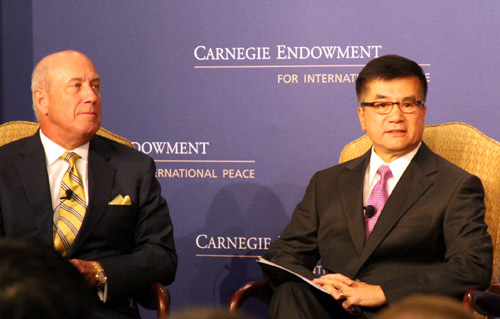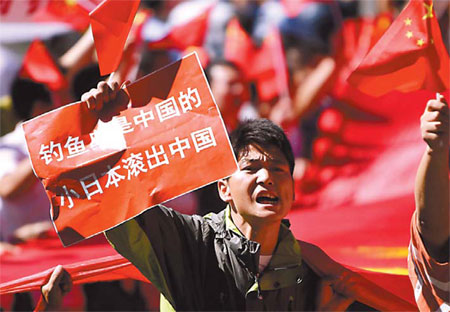Locke pushes for dialogue
Updated: 2012-09-14 11:30
By Tan Yingzi in Washington (China Daily)
|
||||||||
 |
|
US Ambassador to China Gary Locke (R) talks during an event hosted by the Carnegie Endowment for International Peace and US-China Business Council in Washington, DC, Thursday. [Photo by Sun Chenbei/chinadaily.com.cn] |
US Ambassador to China Gary Locke re-emphasized the US' neutral stance on the territorial disputes in both the East China Sea and South China Sea in a speech on Thursday in Washington, saying the issue should be resolved through dialogue.
"We are very sincere about our statement saying we are neutral," he said after delivering a speech at an event hosted by the Carnegie Endowment for International Peace and US-China Business Council, his only public appearance during his trip to the capital.
"We take no position on who is right and we do believe that both sides need to try to resolve this and it counts on China and the Philippines to have their own negotiations, China and Vietnam on a bilateral basis," he added.
| ||||
China, with its claims of the South China Sea overlapping claims by Vietnam, Malaysia, Brunei, and the Philippines, has been trying to solve the issue through bilateral negotiations.
Since April, tensions between China and Japan have escalated over territorial claims to the Diaoyu Islands in the East China Sea.
|
A protester, taking part in a demonstration outside the Japanese embassy in Beijing on Thursday, displays a sign stating that "The Diaoyu Islands belong to China, Japan get out of China". Jason Lee / Reuters |
On Tuesday, despite the opposition from Beijing, Japanese government purchased three of the Diaoyu Islands.
Two China Marine Surveillance patrol ships reached waters around the islands on Tuesday morning. The Chinese military said it reserves the right to take action to defend the territory.
The Philippines also made a provocative move on Wednesday to unilaterally rename the waters around, within and adjacent to China's Nansha Islands and Huangyan Island as the "West Philippine Sea" in an administrative order signed by President Benigno Aquino, according to Xinhua News Agency.
Ambassador Locke said that during Secretary Clinton's previous visit to Beijing, both Washington and Beijing had "very good" discussions on those territorial issues, with both seeking to "lower the temperature."
"What we do care about is that making sure that neither side, no claimant, engages in any type of activity that escalates tensions and jeopardizes safety and freedom of navigation for everybody," he said.
tanyingzi@chinadailyusa.com

 Relief reaches isolated village
Relief reaches isolated village
 Rainfall poses new threats to quake-hit region
Rainfall poses new threats to quake-hit region
 Funerals begin for Boston bombing victims
Funerals begin for Boston bombing victims
 Quake takeaway from China's Air Force
Quake takeaway from China's Air Force
 Obama celebrates young inventors at science fair
Obama celebrates young inventors at science fair
 Earth Day marked around the world
Earth Day marked around the world
 Volunteer team helping students find sense of normalcy
Volunteer team helping students find sense of normalcy
 Ethnic groups quick to join rescue efforts
Ethnic groups quick to join rescue efforts
Most Viewed
Editor's Picks

|

|

|

|

|

|
Today's Top News
Health new priority for quake zone
Xi meets US top military officer
Japan's boats driven out of Diaoyu
China mulls online shopping legislation
Bird flu death toll rises to 22
Putin appoints new ambassador to China
Japanese ships blocked from Diaoyu Islands
Inspired by Guan, more Chinese pick up golf
US Weekly

|

|











